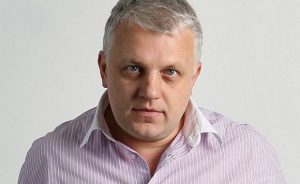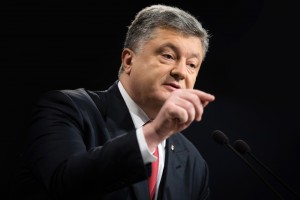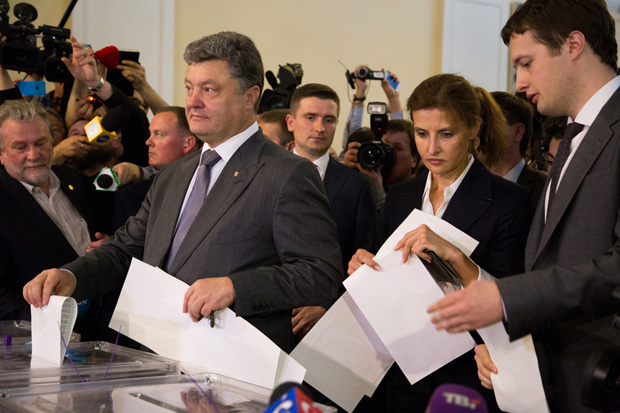3 May 2019 | Media Freedom, media freedom featured, News and features
[vc_row][vc_column][vc_single_image image=”103553″ img_size=”full”][vc_column_text]The investigation into the July 2016 murder of Belarusian journalist Pavel Sheremet in Kyiv, Ukraine continues to be shrouded in mystery. Ukrainian authorities have remained silent, releasing no new information since July 2017.
“The authorities in Ukraine must ensure that there is a fully transparent investigation and they must do their utmost to make real progress,” Joy Hyvarinen, head of advocacy at Index on Censorship said. “There are now too many unanswered questions related to the murder of Pavel Sheremet. The murder cannot be allowed to go unpunished.”
Journalists from the Organized Crime and Corruption Reporting Project, in partnership with Slistvo.info studied a number of leads on the case and analysed footage from more than 50 different surveillance cameras. They used their findings to create an investigative documentary called “Killing Pavel” which later won the IRE Medal, the highest honour that can be received for investigative journalism. One of the most significant findings detailed in the documentary, which was released in May 2017, was the revelation that a former Ukrainian secret service agent and two unidentified individuals were present outside Sheremet’s apartment when the explosives were planted under his car.
Petro Poroshenko, the former president of Ukraine, said in July 2016 that justice for Sheremet’s murder was a “matter of honour” and that the case would be treated with utmost priority. However, he has failed to follow through on this bold statement. Ambassadors from the USA, Canada, the UK, France, Germany, Italy and Japan have emphasised “the importance of continuing the investigation” in order to bring those responsible to justice. Pressures from other countries, human rights organisations and journalists rights groups, have had little effect on the overall progress of the investigation.
Sheremet, who primarily covered political figures, received considerable recognition for his work exposing corruption in Belarus, Russia and Ukraine. According to a letter from Olena Prytula, his partner and the owner of the Ukrainska Pravda news site, to the prosecutor general Yury Lutsenko, Sheremet “was stripped of his Belarusian citizenship due to his criticism of the Belarusian government”. In addition to spending three months in prison for speaking out against the government of Belarusian President Alexander Lukashenko, Sheremet’s Belarusian cameraman, Dzmitry Zavandski was also kidnapped and killed in 2000 after returning to Belarus from a reporting trip in Russia.
The presidents of Ukraine and Belarus met on 20 June 2017 to solely discuss “economic co-operation” between the two countries. However, this meeting was highly criticised by journalists for being held on the first anniversary of Sheremet’s murder and the honours with which Lukashenko was received by Poroshenko.
Poroshenko’s support of Lukashenko and his desire to establish closer relations with Belarus conflicted with the promises he made to attack corruption, and bring resolve to Sheremet’s case. Mustafa Nayyem, a Ukrainian journalist and the co-founder of the Hromadske Network, criticised Poroshenko for praising Lukashenko, whose acts of corruption and crimes against human rights directly tie him to Sheremet’s case. In a Facebook post that later received substantial support from the public, Nayyem wrote that Lukashenko “destroyed freedom of speech in his country, under whom hundreds of journalists have disappeared or been jailed” and emphasised the fact that it was “the very same Lukashenko under whom Pavel was sent to pretrial detention and his friend and cameraman was brutally murdered”.
Volodymyr Zelenskiy, a Ukrainian comedian who defeated Poroshenko in the Ukraine presidential election on 21 April 2019 by a landslide winning 73% of vote, has repeatedly denounced corruption and has promised to expel it from the Ukrainian government; however he has not yet addressed the future development of Sheremet’s case or any other unsolved cases. Although Sheremet’s case has been ignored for almost three years, it has not been forgotten.
On the second anniversary of Sheremet’s murder, Marie Yovanovitch, the US ambassador to Ukraine, said in an interview for Radio Liberty that Sheremet “played an immensely important role here in Ukraine, in terms of finding out what was happening and presenting it to the Ukrainian people so that they could make their own decisions about the situation in the Ukraine”. Furthermore, she emphasised the importance behind the renewal of the investigation, and stated that the “Ukrainian people deserve to know the truth about what happened”. However, the truth continues to be sidestepped regardless of continual demands from country ambassadors, human rights organisations, journalists and the Ukrainian community for justice.[/vc_column_text][/vc_column][/vc_row][vc_row][vc_column][vc_basic_grid post_type=”post” max_items=”4″ element_width=”6″ grid_id=”vc_gid:1556881896863-0ee92b86-a4fa-7″ taxonomies=”8568″][/vc_column][/vc_row]
20 Jul 2017 | Campaigns -- Featured, media freedom featured, Statements
[vc_row][vc_column][vc_column_text]His Excellency Petro Poroshenko
President of Ukraine
11 Bankova Street
Kiev 01220
Ukraine
CC: Yuriy Stets, Minister of Information Policy
Dear President Poroshenko,

Pavel Sheremet (Photo: Ukrainska Pravda)
We are writing as active partners of the Council of Europe’s Platform to protect journalism and safety of journalists to urge you to ensure that Ukrainian investigating authorities carry out a thorough, independent, and effective investigation into the murder a year ago in Kiev of prominent Belarusian-born journalist Pavel Sheremet.
Sheremet’s killing in a car bombing in Ukraine’s capital city on July 20, 2016, cast a chill over the country’s press corps, and the ongoing impunity for those behind the crime has continued to affect journalists’ ability to cover sensitive subjects.
The current investigation by Ukrainian authorities, including the General Prosecutor’s Office (GPO), National Police, and Security Service of Ukraine (SBU), has produced no results a year after the killing, as confirmed by Committee to Protect Journalists’ recent report, Justice Denied: Ukraine comes up empty in probe of Pavel Sheremet’s murder, which CPJ launched in Kiev last week. Moreover, as CPJ confirmed during its advocacy mission that week–including in a July 11, 2017, meeting with you—authorities currently have no suspects and no leading motive for the murder.
Independent, enterprising journalists in Ukraine work under hostile conditions filled with threats, harassment, and cyberbullying in retaliation for their critical coverage of government policies and the conflict between pro-Russia separatists and Ukrainian security forces in the country’s east. A number of journalists have said they work in fear, both because of the impunity in Sheremet’s killing and authorities’ failure to recognise the importance of a critical, independent press in a democratic society.
The report on Sheremet’s murder brought into relief a number of flaws in the official investigation that need to be addressed without delay. Crucial video evidence that showcased potential suspects or key witnesses of the crime surfaced only after Ukrainian journalists—not investigators—published it. No one has publicly identified two persons seen on security camera footage apparently planting the bomb under Sheremet’s vehicle, although investigators are in possession of a clear photograph of one of the individuals.
The report also found that police and security service officials have each alleged that the other destroyed video evidence; potential witnesses and Pavel Sheremet’s colleagues say investigators have not closely questioned them; and the national police chief first tasked with leading the murder investigation resigned, citing obstruction by her superiors.
Pavel Sheremet and his former Ukrainska Pravda colleagues were under surveillance in the months before his death, but it is unclear by whom, or why. We are very concerned for their safety, especially given that it remains unclear whether the fact of the surveillance is currently being investigated.
The confirmed presence of a former SBU agent, Igor Ustimenko, near Sheremet’s apartment the very night assassins planted the bomb under his car—and the ongoing lack of clarity about the reasons and circumstances of his presence—further raise doubts about the genuineness and thoroughness of the official investigation.
The authorities were unable to provide clear answers to pressing concerns, including to such basic procedural questions as who is in charge of the investigation or why the photo of the person seen on camera footage apparently planting the bomb has not been publicly disclosed. We hope that these issues can be addressed immediately.
Press freedom concerns, including the lack of progress in Sheremet’s murder investigation, were also raised during meetings between the partners of the Council of Europe’s Platform to protect journalism and safety of journalists, and Ukrainian investigating authorities on April 4-5, 2017.
We encourage you, Mr. President, to ensure that the investigation into Sheremet’s killing examines the possibility that Ukrainian officials—former or current—may have been involved. In order to do that, we ask you to consider independent oversight of this case, which is a litmus test not only for Ukraine’s commitment to press freedom but also for its adherence to the rule of law.
We are pleased to learn that during your July 11 meeting with CPJ, you made a commitment to invite an international criminal investigator to support the Ukrainian investigation into Sheremet’s murder. We hope that discussions on this initiative will take place between Ukraine and its international partners without delay, and we encourage you to immediately contact Ukraine’s partners, including the Delegation of the European Union in Kiev, in relation to that.
Lastly, we strongly urge you to take all measures to protect the space for critical and independent journalism, including by condemning the practice of dividing journalists into patriotic and unpatriotic; and by ensuring that reporters can work freely, without fear of reprisal, and with the full protection of the state. Publicly addressing Pavel Sheremet’s colleagues at Ukrainska Pravda on the anniversary of his murder, and making a commitment to defending their safety, would be an exemplary first step toward achieving that goal.
Thank you in advance for your consideration of these urgent matters. We await your response.
Sincerely,
Article 19
Association of European Journalists (AEJ)
Committee to Protect Journalists
European Federation of Journalists (EFJ)
Index on Censorship
International Federation of Journalists (IFJ)
International Press Institute (IPI)
International News Safety Institute (INSI)
Reporters Sans Frontieres (RSF)[/vc_column_text][/vc_column][/vc_row][vc_row][vc_column][vc_separator color=”black”][vc_row_inner][vc_column_inner width=”1/2″][vc_custom_heading text=”Ukraine” font_container=”tag:p|font_size:30|text_align:left” use_theme_fonts=”yes” link=”url:https%3A%2F%2Fmappingmediafreedom.org%2F|||”][vc_column_text]Index on Censorship monitors press freedom in Ukraine and 41 other European area countries.
As of 20/07/2017, there were 284 verified reports of violations connected to Ukraine in the Mapping Media Freedom database.[/vc_column_text][/vc_column_inner][vc_column_inner width=”1/2″][vc_single_image image=”94485″ img_size=”full” onclick=”custom_link” link=”https://mappingmediafreedom.org/#/”][/vc_column_inner][/vc_row_inner][/vc_column][/vc_row]
19 Jan 2016 | Europe and Central Asia, Mapping Media Freedom, mobile, News and features, Ukraine

President of Ukraine Petro Poroshenko. Credit: Drop of Light / Shutterstock.com
Since October 2015, Index on Censorship’s Mapping Media Freedom project has recorded a total of 40 verified violations against press freedom in Ukraine, six of which took place in Crimea. Of these reports, 17 included a physical assault or an attack to property, showing just how unsafe the country is for many media workers. To break this number down further, seven violations were physical attacks on journalists only, six were solely damage to journalists’ property and four included a mix of both.
“State and non-state actors alike are undermining the freedom of the press in Ukraine, including Crimea,” Hannah Machlin, Index’s Mapping Media Freedom project officer, said. “Clashes in the eastern region of the country, along with blocked access to local government meetings, frequently incite threats against media workers, including arrest, harassment, violence and even death, all of which set a disturbing precedent for the country as a whole.”
The media in Ukraine may be protected in theory by laws that allow access to information and the increased independence of the broadcasting regulator, but as Mapping Media Freedom shows, this isn’t so much the case in practice.
Below, Index on Censorship details just 10 of the verified incidents since October 2015, highlighting the problem of violence — from the police and politicians to far-right extremists and unidentified assailants — and damage to property against media workers in Ukraine.
Source: Mapping Media Freedom, Index on Censorship’s joint project with European Federation of Journalists and Reporters Without Borders to monitor censorship and violence against journalists in Europe.
27 May 2014 | News and features, Politics and Society, Ukraine

Petro Poroshenko at a polling station (Photo: Oleksandr Ratushniak/Demotix)
Petro Poroshenko has won the Ukrainian presidential election in the first round, as preliminary results and exit polls show he received over 50% of votes. A billionaire, sometimes dubbed “the Chocolate Oligarch” (his main asset is Roshen, the largest confectionery manufacturer in Ukraine) gained his popularity during the Euromaidan protests in November 2013 – February 2014. Many in Ukraine consider Poroshenko to be a controversial figure as the head of the country; he represents a revolutionary, pro-European, but still old, oligarch-driven elite, and a system the Euromaidan protests were aimed against. Yet, the huge support he received shows Ukrainians are tired of the period of uncertainty, and united to give their country a new legitimate leader who can deal with unrest in the south-east regions, where pro-Russian militants continue their attempts to destabilise the situation.
Poroshenko’s first-round victory is a sign of national agreement, but is hardly a final remedy for all the problems Ukraine faces, both externally — like the military threat from Russia, including the occupation of Crimea — and internally. The latter applies not only to economic difficulties, but also to the necessity of extensive reforms that deal with the whole system of interrelations between the state and the society, ensuring real rule of law and putting end to corruption and human rights abuses.
Events in Ukraine over the last six months have made the country one of the most dangerous places for journalists in the world. According to the Institute of Mass Information, there have been 218 cases of physical attacks against reporters in Ukraine in 2014. Viacheslav Veremiy, a reporter for Ukrainian Vesti newspaper, was shot during events on Maidan on 19 February. Vasily Sergiyenko, a journalist and a civic activist, was tortured and then killed in Cherkassy in April. The death toll continued to rise even on the eve of the election, as Andrea Rocchelli, an Italian photo reporter, and his interpreter Andrei Mironov, a Russian human rights activist and a Soviet-era political prisoner, were killed on 24 May near Slovyansk, in the Donetsk region.
“It is still difficult to say if the free speech situation will improve after the election, especially in the east of Ukraine. It will depend on effectiveness of work of the new president and development of relations with Russia,” Tetiana Pechonchyk, the head of the Human Rights Information Centre, told Index on Censorship.
But it is not only the areas of military conflict that are dangerous for journalists. Sergiyenko’s murder and the case of Evgen Polozhiy, the editor of Panirama newspaper from Sumy, who was severely beaten, show reporters’ work is becoming increasingly risky business in Ukraine.
“There were quite a number of journalistic investigations before the Euromaidan, but they led to no official reaction or criminal cases about corruption revealed. Now that the society has changed, corrupt officials and criminals are especially afraid of critical reporting as they can lose their positions or even go to prison; they choose different methods to silence investigative journalists,” Pechonchyk says.
Another important aspect of a media reality around events in Ukraine is the massive information war, launched by Russia. The aim is to show a distorted picture of a modern Ukraine as a state where right-wing extremists and “fascists” seized power, in spite of the fact that the leader of the notorious “Right Sector” organisation got less than 1% of votes during the presidential election. They also aim at perplexing the foreign audience by mixing the terms “Russian-speaking” and “Russian”, for instance to justify invasion of Crimea or actions of pro-Russian militants in Donetsk region.
“That’s what you expect Russia to do — blow the country over with lots of stereotypes, lies and myths. Unfortunately, the Ukrainian government lost this information war. But what is great is that civil society, bloggers, ordinary young people on Facebook confronted Putin’s lies with their activity and creativity, with websites that disprove Russian TV channels’ propaganda or fake news,” says Michael Andersen, a journalist who made a documentary for Al Jazeera about typical stereotypes around Ukraine and Ukrainians.
The latter still have a long way to go to ensure the Maidan changes a lot more than just the name of the president and the faces of the governmental officials. Civil society and the media have a vital role to play on this path to future reforms.
This article was published on May 27, 2014 at indexoncensorship.org



